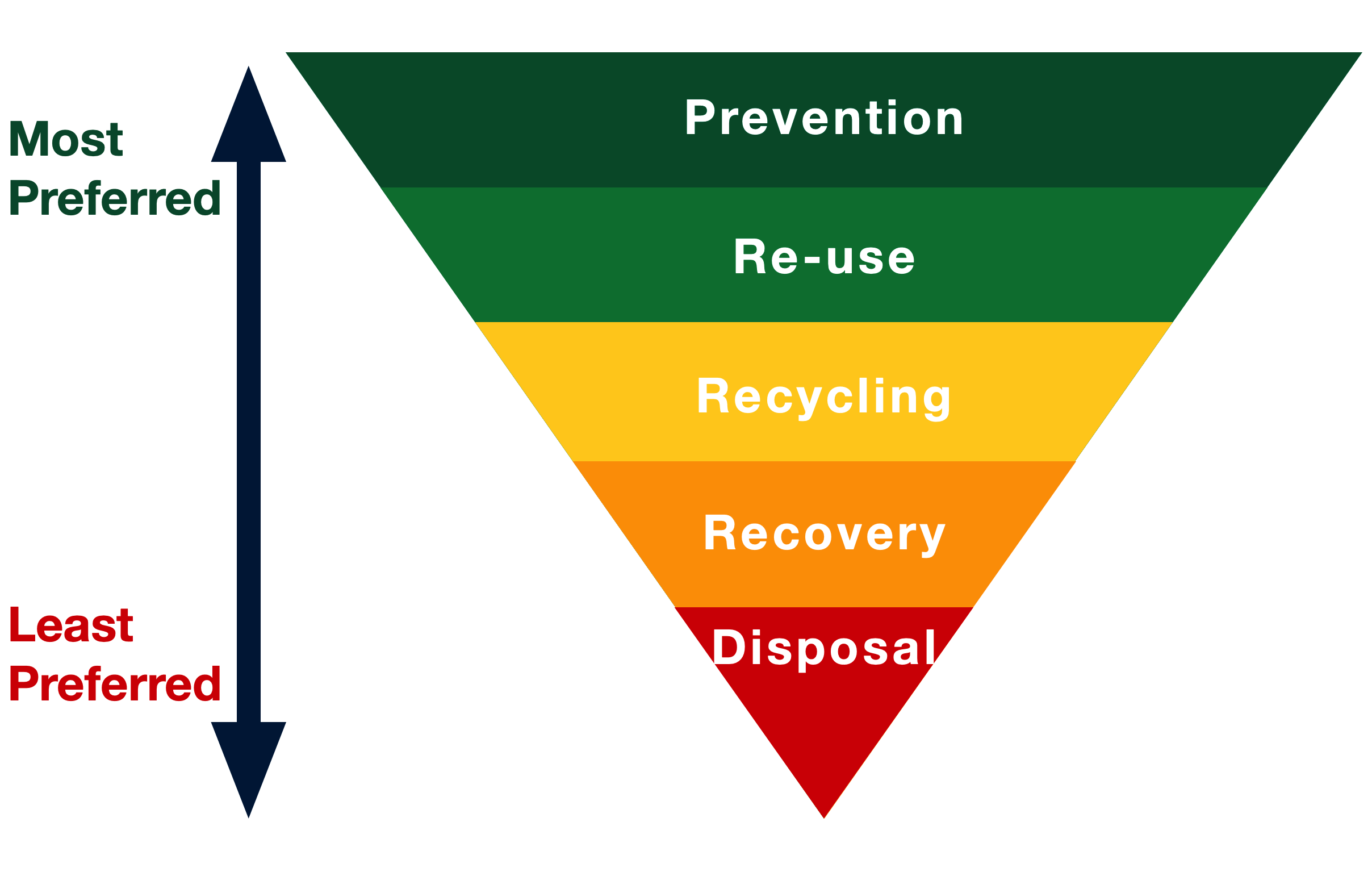Posted: 24th June 2021
What is the Waste Hierarchy?
The waste hierarchy is a simple ranking system used for the different waste management options according to which is the best for the environment. The most preferred option is to prevent waste, and the least preferred choice is disposal in landfill sites.
The waste hierarchy outlines a preferred order for waste management: prevention, reuse, recycling, and energy recovery, with disposal as a last resort. This strategic approach promotes environmentally friendly practices, ensuring efficient resource use and reducing environmental impact.

Prevention
The idea of avoiding things becoming waste in the first place is essential and the most preferred option in the waste hierarchy.
When we take action to prevent waste from arising in the first place, there is simply less waste. Less waste means less need to reuse products, less disposal and most importantly, less waste at landfill sites.
We can prevent waste by using fewer and avoiding unnecessary materials during design, manufacturing and packaging products. It also means using less hazardous waste materials where you can.
Reuse
When waste is created, the waste hierarchy prioritises reuse. Where possible, reusing products and materials before it becomes waste is the next best option.
By cleaning, repairing and refurbishing items, we can significantly increase the number of things we reuse.
As more single-use products are being fazed out for reusable alternatives, re-using things is more accessible than ever. Common examples include reusable bottles/cups for drinks on the go and reusable shopping bags.
Recycling
Recycling is the most environmentally friendly solution when it comes to disposing of waste. Recycling essentially turns our waste into a new item or product, reducing the amount of raw materials required.
Today, the majority of items we use can now be recycled. Everyday products that we can recycle include paper, cardboard, glass, wood, metal and most plastics.
Recovery
Recovery is the next best option when we can't apply the first 3 Rs of waste management in the waste hierarchy. For waste that we can't recycle, it may be possible to recover energy in the form of "waste to energy".
Waste to energy is the process of incinerating non-recyclable waste to produce electricity. WtE helps reduce our reliance on fossil fuels and decreases carbon emissions.
Composting is also a method we use when we can't recycle materials. Composting turns organic wastes into nutrient-rich food for plants.
Disposal
The least sustainable option in the waste hierarchy and our last resort is landfill and incineration when energy recovery isn't possible. In the UK, landfill is highly taxed by the government to help promote more sustainable methods in the waste hierarchy.
Landfill tax sees yearly increases in April, and as of April 2025, landfill tax is £126.15 per tonne of waste. Not only is landfill unsustainable, but it is also by far the most expensive method in the waste hierarchy.
What does the waste hierarchy mean for businesses?
The waste hierarchy legally applies to all businesses and organisations that produce waste according to the guidelines of the Waste (England and Wales) Regulations 2011.
Any organisation that imports, produces, collects, transports, recovers or disposes of or operates as dealers or brokers of waste will be affected and must consider the hierarchy when choosing a waste management option for their waste.
All waste transfer notes and waste consignment notes now include a declaration saying that the waste hierarchy has been applied to the waste in line with the waste duty of care.
Has your business embraced the waste hierarchy?
Businesses, by law, are required to apply the waste hierarchy to their waste management. Not only does applying the waste hierarchy ensure that you comply with waste legislation, but it can also save you business a significant amount of money by preventing waste from being sent to landfill. Less waste being sent to landfill means your business will pay less landfill tax. Here at ISM Waste & Recycling, we always implement the waste hierarchy; it's just one of the many reasons to choose us as your waste management provider. Call us on 01706 823001 for more information about our recycling-led waste management services.
Useful Links: